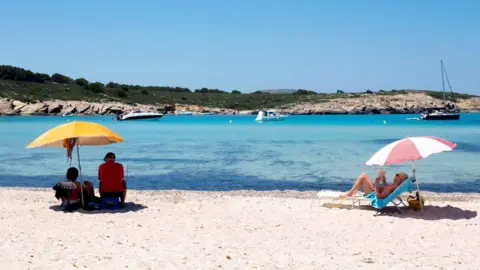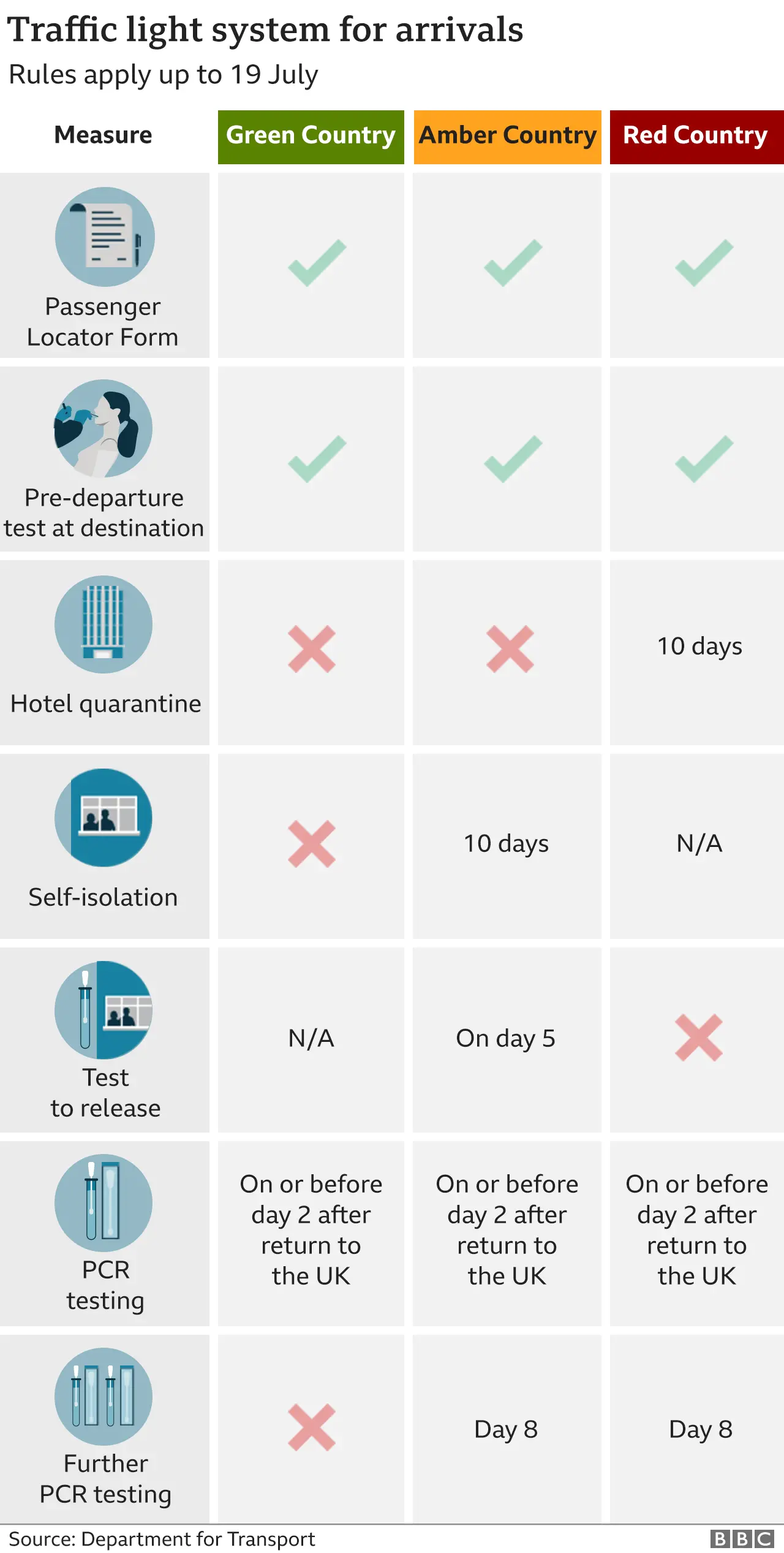Covid-19: Ibiza, Majorca and Menorca moved to amber travel list
 EPA
EPAIbiza, Majorca, Menorca and Formentera are being moved onto the government's amber travel list for England.
The Balearic Islands will join the list from 04:00 BST on Monday, 15 days after they were moved to the green watchlist.
The Scottish and Welsh governments said they will do the same, and Northern Ireland is expected to follow suit.
From Monday, only people aged over 18 who are not fully vaccinated will still have to quarantine on returning from an amber list country.
The requirement to self-isolate is being scrapped for the fully vaccinated and under-18s from Monday in England, Scotland and Wales but travellers in Northern Ireland will have to wait another week before the rule change.
The British Virgin Islands are also moving to the amber list, while Cuba, Indonesia, Myanmar and Sierra Leone will be moved to the strictest red list.
Bulgaria and Hong Kong will move to the green list, while Croatia and Taiwan join the green watchlist, which means they are at risk of being moved to amber.
 Getty Images
Getty ImagesIt is understood that data indicates a big rise in cases in the Balearic Islands following end-of-term parties.
Transport Secretary Grant Shapps said case rates had doubled since the islands were added to the green watchlist, which meant the government needed to "move quickly".
He also warned that people travelling abroad this summer will need to make sure they can get their money back or rebook their accommodation, adding that "no-one can be out there thinking we can travel and just rely on things not changing".
But package holiday firm Tui said the "continued lack of transparency" about the methodology and data behind the changes was making it "incredibly difficult for customers to book far in advance with confidence".
EasyJet said it could not understand why people were going to be allowed to attend nightclubs from Monday without a mask or social distancing but the government was "not comfortable with people going to the beaches of Europe where the infection rates are lower than in the UK".
Virgin Atlantic called for the government to "act decisively" and add nations with high vaccination rates, such as the US, to the green list at the next review.
Labour criticised the government for not publishing the country-by-country data that informs its traffic light system.
Shadow transport secretary Jim McMahon said: "People are booking holidays in good faith and now face the prospect of losing out because ministers refuse to be straight with the public."

'I'm sick of everything'

Medi Jones Williams, from Bristol, booked a holiday to Majorca on Friday and said she still planned to fly there on Saturday for her seven-day trip.
The 25-year-old had her first vaccine three weeks ago, and is now looking to get a second dose as soon as possible.
She told the BBC: "I'm still going to go because I'm sick of everything. I feel like if I don't it will never happen because things keep changing.
"I do understand why they have to vaccinate older people first but when they got to 40 they should have vaccinated everyone.
"It doesn't make sense to open on Monday when not everyone is vaccinated."

'No guarantees'
Mr Shapps defended the government's traffic light system, saying that the categories mean "people can see, broadly-speaking, where these countries are classified".
He added: "We're not in control of this virus, particularly in how it affects other counties, their levels of vaccinations, their level of genomic sequencing, their testing regimes."
Travelling to green list destinations was likely to be a "better bet" than those on the green watchlist, he said, but cautioned "there are no guarantees".
He urged people to come forward and get both vaccine doses to give them "one more piece of security when you do go off to travel".
The changes will come as bad news for travellers who are over 18 and not yet double vaccinated.
The government says they can still pay for additional tests on day five as part of test-to-release and are advising everyone to get their jabs as quickly as possible.
Under the change to amber list travel rules, announced last week, fully-jabbed people will still be required to take a test three days before they return and on the second day after they are back - but they will now be exempted from a day eight test.

From Monday - when most Covid rules in England end - the guidance that people should not travel to amber list countries will be removed.
Fewer than 30 destinations are on the green list, which do not require people to quarantine on their return.
More than 50 countries are on the strictest red list, which requires arrivals to pay to self-isolate in a hotel.
But most places - including holiday hotspots such as mainland Spain, Greece and the US - are on the amber list.
Green watchlist countries do not require arrivals to quarantine but are at risk of being moved to amber.
Meanwhile, more than two thirds of adults in the UK - some 35 million people - have now received both vaccine doses, the government announced on Wednesday.
The government said it meant it had hit its target of vaccinating two thirds of adults by 19 July early.
Some 46,037,090 people have received a first dose while 35,155,767 have had both doses - the equivalent of 87.4% and 66.7% of the adult population respectively.
Prime Minister Boris Johnson described the milestone as "another extraordinary achievement", adding that it was enabling the UK to "cautiously ease restrictions next week and return closer towards normal life".
On Wednesday, the UK recorded another 42,302 cases and 49 deaths within 28 days of a positive coronavirus test, according to the daily government figures.
- Additional reporting by Kris Bramwell

Are you a holidaymaker or a travel agent? How will you be affected by this change to the travel list? Email [email protected].
Please include a contact number if you are willing to speak to a BBC journalist. You can also get in touch in the following ways:
- WhatsApp: +44 7756 165803
- Tweet: @BBC_HaveYourSay
- Upload pictures or video
- Please read our terms & conditions and privacy policy
If you are reading this page and can't see the form you will need to visit the mobile version of the BBC website to submit your question or comment or you can email us at [email protected]. Please include your name, age and location with any submission.
